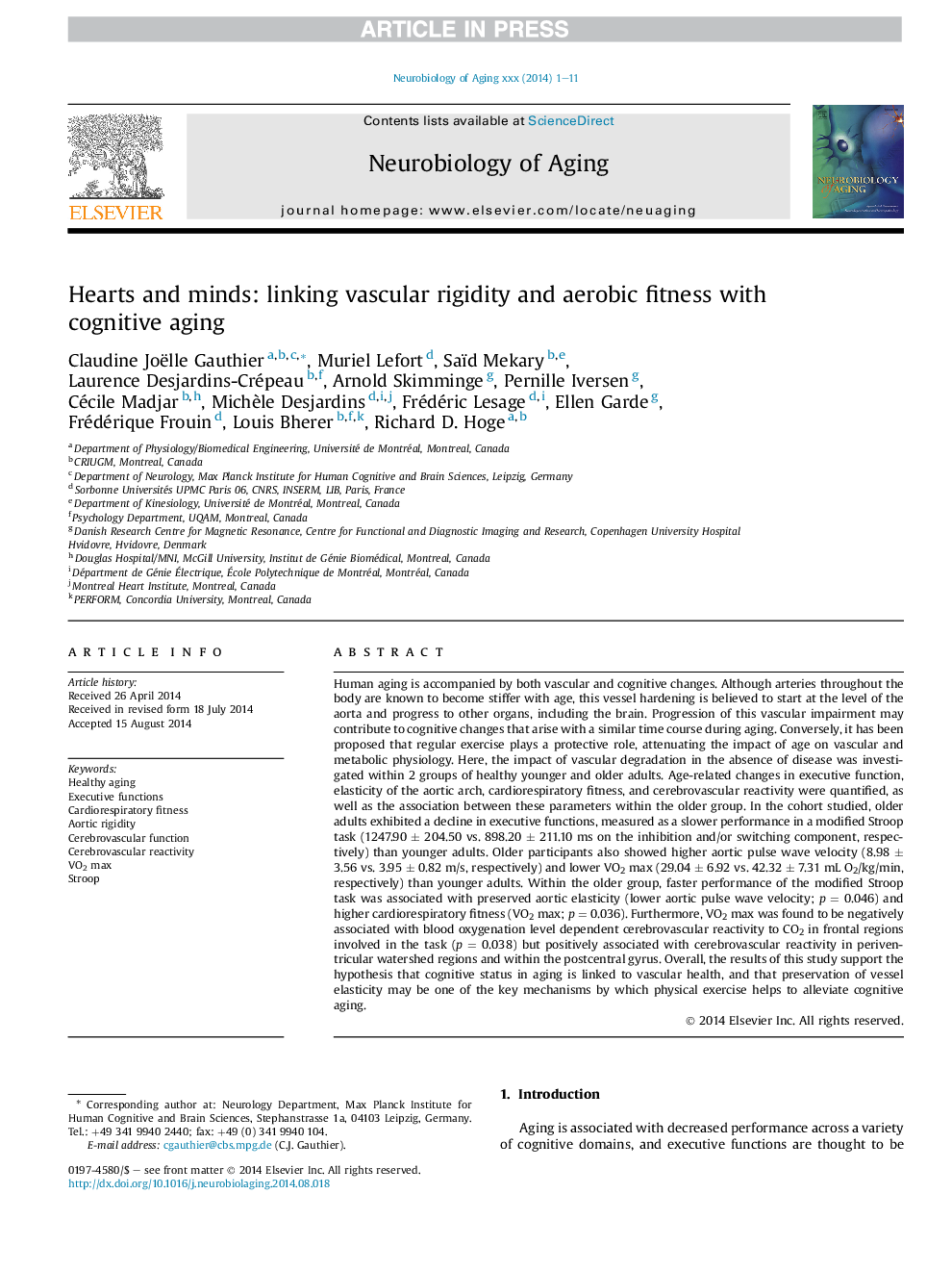| کد مقاله | کد نشریه | سال انتشار | مقاله انگلیسی | نسخه تمام متن |
|---|---|---|---|---|
| 6805030 | 1433560 | 2015 | 11 صفحه PDF | دانلود رایگان |
عنوان انگلیسی مقاله ISI
Hearts and minds: linking vascular rigidity and aerobic fitness with cognitive aging
ترجمه فارسی عنوان
قلب و ذهن: ارتباط استحکام عروقی و تناسب اندام هوازی با پیری شناختی
دانلود مقاله + سفارش ترجمه
دانلود مقاله ISI انگلیسی
رایگان برای ایرانیان
کلمات کلیدی
موضوعات مرتبط
علوم زیستی و بیوفناوری
بیوشیمی، ژنتیک و زیست شناسی مولکولی
سالمندی
چکیده انگلیسی
Human aging is accompanied by both vascular and cognitive changes. Although arteries throughout the body are known to become stiffer with age, this vessel hardening is believed to start at the level of the aorta and progress to other organs, including the brain. Progression of this vascular impairment may contribute to cognitive changes that arise with a similar time course during aging. Conversely, it has been proposed that regular exercise plays a protective role, attenuating the impact of age on vascular and metabolic physiology. Here, the impact of vascular degradation in the absence of disease was investigated within 2 groups of healthy younger and older adults. Age-related changes in executive function, elasticity of the aortic arch, cardiorespiratory fitness, and cerebrovascular reactivity were quantified, as well as the association between these parameters within the older group. In the cohort studied, older adults exhibited a decline in executive functions, measured as a slower performance in a modified Stroop task (1247.90 ± 204.50 vs. 898.20 ± 211.10 ms on the inhibition and/or switching component, respectively) than younger adults. Older participants also showed higher aortic pulse wave velocity (8.98 ± 3.56 vs. 3.95 ± 0.82 m/s, respectively) and lower VO2 max (29.04 ± 6.92 vs. 42.32 ± 7.31 mL O2/kg/min, respectively) than younger adults. Within the older group, faster performance of the modified Stroop task was associated with preserved aortic elasticity (lower aortic pulse wave velocity; p = 0.046) and higher cardiorespiratory fitness (VO2 max; p = 0.036). Furthermore, VO2 max was found to be negatively associated with blood oxygenation level dependent cerebrovascular reactivity to CO2 in frontal regions involved in the task (p = 0.038) but positively associated with cerebrovascular reactivity in periventricular watershed regions and within the postcentral gyrus. Overall, the results of this study support the hypothesis that cognitive status in aging is linked to vascular health, and that preservation of vessel elasticity may be one of the key mechanisms by which physical exercise helps to alleviate cognitive aging.
ناشر
Database: Elsevier - ScienceDirect (ساینس دایرکت)
Journal: Neurobiology of Aging - Volume 36, Issue 1, January 2015, Pages 304-314
Journal: Neurobiology of Aging - Volume 36, Issue 1, January 2015, Pages 304-314
نویسندگان
Claudine Joëlle Gauthier, Muriel Lefort, Saïd Mekary, Laurence Desjardins-Crépeau, Arnold Skimminge, Pernille Iversen, Cécile Madjar, Michèle Desjardins, Frédéric Lesage, Ellen Garde, Frédérique Frouin, Louis Bherer, Richard D. Hoge,
